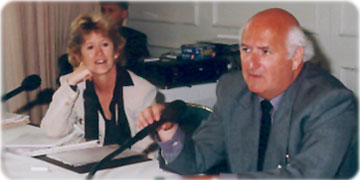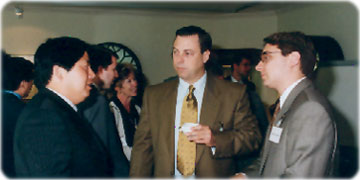 |






|
 |
 |
Conclusions and Agenda for
the Future
Closing the conference, Professor Werner Weidenfeld summed up the
arguments of the preceding two days. He listed five key areas for further
research:

 Coping with
speed. Participants agreed that the pace of change appears to be accelerating,
and that both societies and leaders need mechanisms for coping with rapid
changes. Coping with
speed. Participants agreed that the pace of change appears to be accelerating,
and that both societies and leaders need mechanisms for coping with rapid
changes.
 Civil society
needs to be strengthened. While it cannot replace the state or private
enterprise, civil society fills gaps left by both. Future societies that
do not have sufficient balance among the three will serve their citizens
poorly. Civil society
needs to be strengthened. While it cannot replace the state or private
enterprise, civil society fills gaps left by both. Future societies that
do not have sufficient balance among the three will serve their citizens
poorly.
 Demographic
change will place stresses on all industrialized countries, and most developing
ones as well. As societies age, they will need to redefine work and to
reshape the structures that provide for people in retirement. Demographic
change will place stresses on all industrialized countries, and most developing
ones as well. As societies age, they will need to redefine work and to
reshape the structures that provide for people in retirement.
 Our concept
of privacy is under fierce pressure. The ability to store and transmit
personal information rapidly to many different end-users means that individual
reliance on secrecy, anonymity or even discretion can no longer be assured.
Our societies are seeking new balances in the trade-offs between the benefits
of widespread information and personal privacy. Our concept
of privacy is under fierce pressure. The ability to store and transmit
personal information rapidly to many different end-users means that individual
reliance on secrecy, anonymity or even discretion can no longer be assured.
Our societies are seeking new balances in the trade-offs between the benefits
of widespread information and personal privacy.
As part of its ongoing work, the Research Group on the Global Future will
pursue each of these themes.

Yoshimasa Hayashi, Stephen O'Connor, William Wechsler.
Participants in the conference offered additional final points
(links lead to summaries of presentations):
Dr. Gregory Stock
The speed of change adds up to a qualitative difference
Unified global responses to the problems addressed here are probably bad
ideas; we should preserve the opportunity for solutions to compete
We need to incorporate biotechnology into our existing models for making
medical decisions. They are both adequate and allow for case-by-case examination
of circumstances.
Dr. Moira Gunn
Responsible use of information can be programmed into the networked structures
that we build. We must ask computer science to respond to our societal
needs, not ask our society to adjust to what the computer companies want
to provide.
Jon Bingen
Common denominator of problems listed is that of building a legitimate,
functional state with proper financing.
Josef Janning
Looking explicitly at urban communities will demonstrate many of the points
raised during the conference
Dr. Christof Erhart
Focus more in the individual level than on the systemic level
Robbie Oxnard Bent
Dialogue about the future should be as broadly based as possible
Dr. David Brin
We should look more at non-zero-sum alternative means of dispute resolution
We need to revisit the discussion about whether or not some ideas are
inherently toxic
These comments will also be incorporated into the continuing work of the
Research Group on the Global Future.
|
 |

